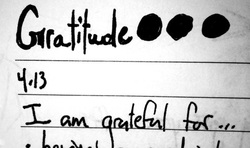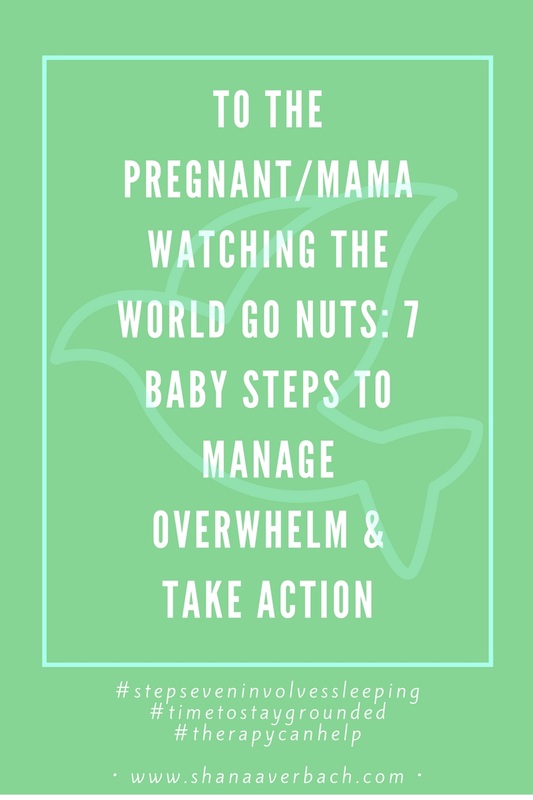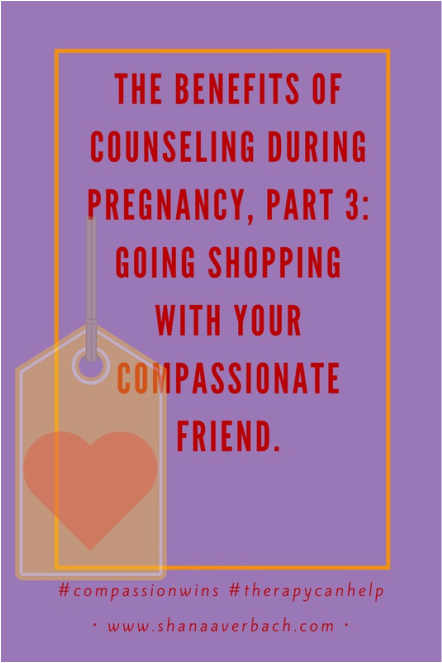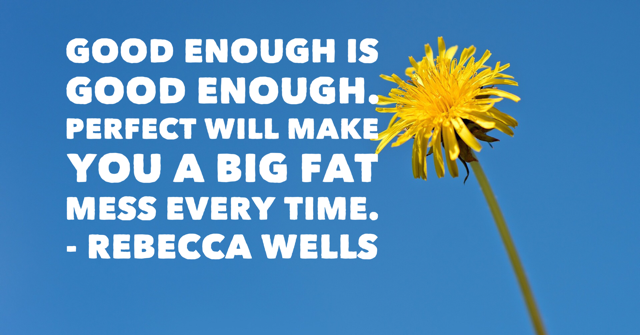To the Pregnant/Mama Watching the World Go Nuts: 7 Baby Steps to Manage Overwhelm & Take Action11/14/2016
So you’re growing a new life or snuggling your little and looking around the world and going WTF DID I JUST GET MYSELF INTO?
You are in good company, mama. Oof. I originally wrote this after the 2016 election and sadly have had countless reasons to update around the triggering event. Today is another one of those days. I don’t need to go into specifics, because this is about moving forward. But I’ll say this: I remember weeping at much smaller scale disappointments when I was pregnant (read: people not giving up their seats on the bus) and needing to avoid the news altogether for the sake of self preservation. The impact of these events are strong strong, and touch on so many pain points. It’s tough, mamas. It can feel like too much to take in, I know. So I want to walk you through a simple process that will help you to take solace in small action(s). So much of this new mama/mama-to-be business is about managing the overwhelm. This is an effort to do just that. Step 1: Give yourself permission to turn off the news and take a break from social media (after you share this article, of course ;) The world will not end if you disengage with the flood of stories. Step 2: Put one hand on your heart and one hand on your belly. Take a few deep breaths to the extent that you can. Feel your belly, then your chest rise. Stay here for a few moments. Maybe let out an audible sigh. Step 3: Imagine ONE domain of this world that you would like to see be better for your little one. Is it the environment? Healthcare? Gun control. Reproductive rights. Communication across class and political lines? Anything. See what comes. Step 4: Think of ONE small action you can take RIGHT NOW to facilitate progress in that arena. Don’t worry about the size of your action. Ask yourself, is it more than nothing? Great. (There are countless tips online about actions you can take that should speak to whatever you came up with. Beyond that, you can be creative) Step 5: Ask yourself: Does my action bring harm to anyone? If the answer is no, proceed. Step 6: Repeat as often as you wish. Step 7: Take a nap. Yours in wellness, self-care and compassion, Shana Think I may be the right fit for you or a loved one? Feel free to email me at [email protected] or call 415-963-3546 for a free 20-minute consultation call. The Benefits of Counseling During Pregnancy, Part 3: Going Shopping With Your Compassionate Friend9/25/2016
Okay, there may or may not be any actual shopping happening (although in this phase there likely is), but now that you’ve bothered to observe your triggers and allow for some feelings, you’re going to want to arm yourself with some tender, loving, possibly quite new ways of responding to yourself. You’re going to want to receive yourself the way a compassionate friend would.
As a reminder, a compassionate response to: I’m hurting, I’m scared, I’m overwhelmed, I don’t know what to do, is not - Get over it. - You’re making too big a deal of this. - A stronger person wouldn’t be so worried about all these things. - There are way bigger problems in the world. - I wanted to get pregnant so I shouldn’t be upset about how I’m feeling. No. A compassionate way to respond would involve some warmth, kindness, and a reminder that you are not alone. It would also allow for the transient nature of your feelings to shine through, as in, this is how you feel right now, not forever. Fun fact: an emotion typically runs its course in about 90 seconds; It’s the ruminative thinking that keeps the party going. So how does counseling get at this? In its most simple form, counseling models the compassionate stance. You learn compassion by receiving it consistently and when you need it most. Since you are doing your therapist the honor of sharing the thoughts you typically keep to yourself, you have the unique opportunity to get a witness. And in that space where you may judge your own feelings and think you are the only person on the planet in your situation, something different happens. This person sitting before you doesn’t roll her eyes, tell you you’re a terrible person, and wish you good luck. She receives your hurt, validates the difficulty, and, in time, may gently invite a more balanced interpretation. She notices the critic in the room and doesn’t even need to squash her. She just asks if anyone else has an opinion to share, and that’s when your own wisdom and perspective gets to speak up. This is one example of how the scariness of vulnerability is matched by the comfort of being seen and accepted, just as you are. And then something different gets to happen. This process is not unlike what you will do as a parent, a phase that is just around the corner, or already in play for those of you who are expecting or planning your next. The way our children learn that they are loved and safe is by having consistent, loving adults who can receive their feelings and experiences. This outside experience eventually is mirrored from within. I know my clients have arrived at a place where there's room for compassion when they pause mid-sentence and say: “I’m not being very nice to myself right now.” Then we open up to the compassionate friend. This opening is a skill to be practiced. So when your own inner mean girl pops up uninvited telling you how fat you look in those jeans and how lame you are for feeling overwhelmed, here are a few ways in and out of the therapy room you can reach out to your inner compassionate friend. 1. Actually pretend you are responding to someone you love tenderly, someone you wouldn’t want to see suffering. Really. Bring forth the thought of such a person. Grab a pen, write it down. I’ll wait. . . Okay, now imagine this person you love dearly is saying what you’re saying: I am tired all the time and my house is a mess. I’m the worst wife ever because I’m neglecting my husband, and I keep dropping the ball at work too. I feel like I’m failing at everything. How would you respond? Would it sounds something like. Oh hon, I can’t do anything when I’m feeling tired. I can imagine how hard it must be to feel that way so often. You are being so hard on yourself because you care deeply about you relationship and your work. But you haven’t been fired from either, so ease up on yourself girlfriend. Do what you can. Now, consider that you are just a person who you don't want to see suffering, and practice turning this inward. 2. Practice the Self-Compassion break. This is my all time favorite tool from Kristin Neff, the Godmother of Self Compassion. In its most simple form it goes like this.: Thinking about a situation that’s difficult, like a level 5 on a scale from 1-10 difficult (you don’t want to overwhelm yourself while you’re learning), and then placing a hand gently on your heart, your cheek, or anywhere else that’s comforting and saying some form of this. This is a moment of suffering, and suffering is part of life, May I be kind to myself in this moment. May I give myself the compassion I need. Or, check out this 5-minute facilitated practice. 3. Name it to Tame it. Labeling what you’re feeling - in and of itself - can actually calm your system. This is another benefit to therapy, as you have some assistance with the naming, but you can certainly do it yourself. When you start thinking about whether or not you are going to go back to work after baby comes and are suddenly weeping and googling and deciding that you’re f*&$ed either way, try this. Pause. PAUSE. And try to name the feeling. You’re feeling SCARED that you aren’t going to figure out the right answer. You are feeling OVERWHELMED by this upcoming transition. Don't worry about doing anything with your observation. Just describe the feeling and let your nervous system rest in its experience of being understood. 4. Breathe. I wanted this to be number one, but I was afraid you’d stop listening. But do this first. Breathe, into your belly, and out slowly. You got this, mama. Yours in wellness, self-care and compassion, Shana Think I may be the right fit for you or a loved one? Feel free to email me at [email protected] or call 415-963-3546 for a free 20-minute consultation call. I"ve written about hypocrisy before, and also about my personal experience forgetting to attune to my own needs, waiting, like so many until I'm feeling super low/immobilized/crazypants.
But one of thing I've yet to mention is that nasty P word ; Perfectionism. Oh how I loathe thee, because you're so damn stifling. You get in the way of good-enough-ness, you stop things before they ever really start. You're as critical as the day is long. Like the last-day-of school-long, or your-toddler-is exercising-his-free-will-via-throwing-himself-on-the-ground-in-response-to-all-your-offers-of-the-wrong-food-and-your partner-has-to-work-late-long. Perfectionism is a bit misunderstood, because it's not about something being perfect per se; it's about you not being good enough unless and until you've figured out the exact right version of something, whether that be a response to someone, the creation of a product, or the a role you are playing. It's a set up to never accept what is. Which is unfortunate, cause that's where all the good stuff lives. I'd say perfectionism is at the crux of many of my clients' struggles, thereby making me (this is going to be the cheesiest thing I've ever said, but in the name of giving less f*#@*s. down with OPP - other people's perfectionism. As a person who specializes in working with high functioning women who are invisibly experiencing anxiety and depression, it's no surprise that these tendencies show up. Every week I sit across from these amazing individuals who have accomplished so many things in some of the big life domains: education, occupation, relationships, friendships, family life, and still have a sense that they are doing life wrong in some way. So we greet the experience, develop compassion together, find and activate a more authentic way to operate, and round out the story. It helps, but it's hard until it isn't anymore - for the person experiencing it, and for the witness. You know what I mean because we all have those people we admire, who don't seem to see themselves in the same light we do. Okay, WAIT, stop. I set out to write about me today, to do it free-write style, with little editing. I set out to actually embody the experience of imperfectionism, if you will. So, bear with me, this is what I wanted to say: I'm certain that the big P is why I haven't written consistently for so long. Okay, initially I stopped because pregnancy stole my attention span, and then mama life, BUT at the same time there entered an epidemic of 3 things you should do if...5 things you should know about..wellness-related content. I found it dizzying and sometimes empty. When it isn't I like it and share it with you on my Facebook page. But I'll admit, for a minute there, I thought I had to do that or do nothing. Also, lots, and I mean LOTS of niche therapist marketing came on the scene like a tidal wave telling me about the right way to do this and the best way to do that, and my response was to shut my ears and computer and just do good direct work with my clients. I have a touch of rebellious spirit, and when I'm told what to do, I, I sometimes stop listening altogether. Like any number of character traits, it's at times helpful (prevents the blind following of things that don't feel right) and sometimes hindering (leads to missing out on certain possibilities). Luckily with self-awareness we get to work with such traits, turn the volume up and down, as appropriate. We get to build discernment into our lives. Here is a good place to mention that #therapycanhelp Anywho, I'm a bit embarrassed to say it, but I lost my momentum and thought I had to think of the Right way to pick it back up. But I know no such thing exists. The truth is I have some things to say, and however long it takes me to organize them, I'm back, starting with imperfect posts, and we'll see where we go from there. Separate and unrelated, but while I have your ear, I wanted to share my latest wellness pick-me-up. I've been doing a 5-minute meditation upon waking up. I use Insight Timer, but there are plenty of others too. (check out my resource page for more recs). It's a great way to start the day feeling grounded, and it's pants optional. So there's that. Okay, all for now. Yours in wellness, self-care and compassion, Shana Have a question or comment? Feel free to share in the comments section. Think I may be the right fit for you or a loved one? Feel free to email me at [email protected] or call 415-963-3546. IKNOWIKNOWIKNOWIKNOW...I am seriously lacking in up-to-date posts. Life has been busy busy, and I have been neglectful of this space. I miss it and will be back soon soon.
Truth is I'm just passing through to share this little feature that alltreatment.com did on me in an effort to bridge the gap between mental health and substance abuse providers in California - a noble and important connection in my eyes. Just some opinions and info on my practice: Shana Averbach Therapist Spotlight. Yours in wellness, self-care, and compassion, Shana Averbach, LMFT 919 Irving Street, Suite 104 San Francisco, CA 94122 Tel/Fax 415.963.3546  Don't worry, I won't be listing out eighteen-hundred anythings, but 1,825 is the number of entries you get when you decide to list five things you are grateful for...each day...for a year, which is the practice I started in the Spring of 2009. With gratitude season upon us, and resolutions (I call them intentions) on the horizon, I thought I would share a few things I learned from this exercise, one that I see as absolutely pivotal to my sense of growth, optimism, and meaning. [For those whose minds have already raced ahead to thinking oy, 5 a day is a lot or pssht, a gratitude practice is just for Oprah or Stuart Smalley, and are on the verge of turning to a celebrity blog or the latest brief upworthy post, I urge you to wait. I do think that this practice is so very worth a shot for everyone, and that is why I'm sharing, but I do not think it has to exceed say, 2-3 items a day, nor does it have to represent a voice that is not your own. As long as it's a practice. And don't worry, the voice of doubt – often present to protect us – is included below as well.] So here we go: 1. If ever I lose sight of my values - those driving life forces - I can always find them in my personal inventory of gratitude data. Themes emerged quickly as I sifted through the info and they can be narrowed down to several categories, including: Human connection: Friends, family, coworkers, and acquaintances were all up in my journal – from my inner circle and immediate family to a tow truck driver with whom I had one conversation, to my acupuncturist (and her whole crew actually). I was grateful for gestures, shared experiences, and for being the recipient of good news. Meaningful work: Gratitude all over the place for people allowing me to witness their challenges, their growth, and their stories overall. Also for professional development. Also for increased confidence over time. Sensory experiences: Hot showers, smooth sheets, warm air, hearing poetry, feeling safe, sunlight, and – I won't give it its own category, even though the sheer volume of entries would warrant it – FOOD. Goodness, I got specific. Lots of comfort food, soups galore. Chocolate cake came up a lot. So did guacamole. Overcoming obstacles: Having the ability to speak even while fighting tears, thinking of alternate solutions, talking myself down or away from anxiety, recognizing my limitations and accommodating them, pushing through when tested, abstaining from dessert (go figure). But I already know my values, you say. Yes, you sure do. I do too, especially when I'm at my best. But on a bad day, I tell ya, the amnesia shows up, and it's strong, isn't it? These life categories can be nudges towards an action to take (e.g., phone a friend, take a hot bath, etc.) or mere reminders of gratitude past (e.g., that perfect guacamole, conversation, etc.) 2. No matter what happens I can always “re-frame” my experiences. Re-frames – or looking at a situation in a way that accentuates something different than you would first notice - are deserving of their own post. They are the thing people arrive at when they suddenly feel different, better, or less oppressed by something. And they can be cultivated. I conveyed gratitude for having a head to ache, having feet to be sore, having people to lose, the prospect of my neighbor not snoring, and the realization that I hadn't been recharging. But if you express gratitude for unpleasant things, aren't you just lying to yourself? Absolutely not. Unlike their counterparts (focusing on the pain, for example), these reframes recognize the experience, but highlight perspective and hope. If this material wasn't part of a practice, there is no way I would have thought to experience it as anything other than what I felt in that precise moment. Re-frames also showed up as exceptions: For difficult times or experiences. Of course an argument would feel bad when you typically get along with someone. Of course feeling achy will suck against the backdrop of feeling well. But “of course” gets lost in our daily experiences when we aren't mindful of them. Valuing the yuck that stands out the most is highly valuable in this practice if it brings your awareness to the yum you may take for granted. [And by the way, we all have (to varying degrees) what has been deemed a “negativity bias,” meaning our brains naturally gravitate towards negative things – likely to protect us from (perceived) danger. Positive psychologists have narrowed down the antidote to a 3:1 ratio – that is three positives to one negative to balance things out. So if you are considering this practice in any form, three may be your magic number.] And finally... 3. I do not believe that finding the love of my life almost precisely six months into this gratitude exercise was an accident (In fact, we had actually met a numerous times before truly meeting.). If you had asked me how I would like to be in when I found the person I would spend the rest of my life with, I would have said I would like to know myself well – how I relate to people, what I like, where I'm confident, and where I...well, need to do a lot of re-framing. I would like to feel strong in my ability to overcome obstacles and to see things in different lights. I would like to know where I stop and he begins. See, people throw around phrases like “you have to be okay with yourself before you can be okay with someone else,” and I don't know about you, but that always sounded very abstract to me. How will I know I'm okay? What will that look and feel like? This practice was one way that I accidentally concretized it, setting in the presence of positivity, focus, and purpose. And love is just one slice of the pie. Could we not all benefit from showing up to everything in this life with these elements? Goodness knows, I feel wobbly at times – negative, flappable, lost – but having gratitude is anchoring to what is important to my core. But what if I try something like this and I still don't find the things I am looking for in life? Aah, the question of the hour. What if this try doesn't "work."? Well, there are no guarantees, but there's a chance you'll see positive side effects from the effort as much as the end result. But more than that, I really hate to see fear getting the last word in any argument, much less one involving self-growth. Fear, like doubt and our negativity bias overall, serves to shield us from all kinds of risks. But like an overprotective parent, it can also keep us from important felt experiences that help us understand our strengths and limitations. Perhaps your first item can be gratitude for the fear's intentions? I just hope you won't stop there. [And you know, if any voice of protection tells you to bolster your support before trying this or any DIY emotional health exercise OR you try and still feel stuck or particularly steeped in the negativity, perhaps reaching out for peer or professional support will help.] So there you have it. I would like to take this moment to express gratitude for each and every set of eyes that grazes my words. I give thanks to you.  I hate running. I hate it. I hate how it makes my body feel from hair follicle to toenail. My legs ache, my lungs burn, my brain feels like it's getting jostled around. I'm as mystified by the elusive runner's high as I am by people who like going to the dentist. And yet. I tend to fit it in somewhere during the week, and for the past three or four weeks have been doing so every other day (big thanks to one of my besties for introducing me to the C25K app). So why would I – a person dedicated to fine-tuned self-care for self and others – engage so regularly in something I can't stand? Well that part is simple. Because I happen to strongly value feeling alert, content, and emotionally stable as often as possible, and getting this type of exercise is one way I can assure myself those experiences. After many moons of getting to know myself (and flaking on the same friend's October 4th birthday celebration three years in a row) I have learned that as soon as the first week of October hits, if I don't pump up my self-care regime to compensate for the subtly changing light, I go to a default setting of sitting still, isolating myself, and thinking something is terribly wrong with me. This of course perpetuates itself, the lack of momentum making it hard to gain speed, and then, well, let's just say I am eternally grateful that I figured this detail out in my mid-twenties and now it's all about noticing and intervening. But every year it's h a r d. This experience, of course, isn't unique to me. After years of sitting with clients, and talking with the other people in my life, I've learned that the action of choosing to do something good for yourself often happens despite yourself. Whether deciding to take a yoga class, reach out to a friend, make dietary changes, start or return to therapy - you name it – we often have to drag ourselves to do it, suffering days, weeks, sometimes years before making a move. So how can we hasten this process and get to the interventions faster? Here are a few tips. 1. Make decisions based on values, not on in-the-moment wants: If I asked myself the question, “do I want to go running,” on a good day I'd say “no thank you” on a crankier one there'd be more expletives. But if I ask myself “do I value feeling peaceful, present, and grounded for myself and for the sake of those I encounter” not only do I answer “absolutely,” but I also walk right into the follow up question “how can I achieve this”? Running is merely one answer and my felt experience tells me it's the strongest contender. But now there's also space for other interventions to surface as well. 2. A. Visualize yourself in the future: Go ahead, let yourself imagine how things will be when you are feeling more like your optimal self. What will it look, taste, smell, and sound like? How will you feel? Who will notice the shift? B. Now think of one step you can take towards manifesting that image. What's your move? What supports do you need to motivate you and hold you accountable? This will get you out of a problem saturated language and into a solution focused one. 3. Welcome the fact that your chosen intervention may be as wonderfully complicated as you. I'm telling ya', every single jogging session is a roller coaster for me. When I'm in a longer interval and feeling the weight of my body, my thoughts are less positive, my eyes move to broken car window glass on the ground. When the interval is over, my step is lighter and I notice the birds tree hopping en masse, and it's beautiful. The highs and lows are symbiotic and the sum total of the experience is absolutely positive and keeps my energy flowing. The same mush of experiences could happen if you sign up for a class or group where you are asked to step out of your comfort zone, but reap the benefits of pushing yourself. Or therapy, where painful thoughts or memories might surface before their sweet release. 4. Know that you can handle every last up-and-down bit of it. Know that you're worth the try.  I was pretty nerdy-excited to overhear a couple arguing about personality types the other night. The woman, who identifies as an introvert, excitedly said how valuable it is to know such things about yourself, especially when conflict arises. The guy was adamant that these things are "bullshit" and he "hates how people use that type of explanation as a crutch." As they went back and forth, I pieced together (pretending they were using "I statements" instead of speaking in generalities) that she would like him to understand her natural way of being so he doesn't take certain actions personally, and he would like her to stay open to thinking/feeling a different way, so that the door stays open to multiple possibilities. I got the sense that things felt closed down and out of his control when framed in these popular psychology terms. Like maybe she would say things like, "I can't go to your business dinner. I'm an introvert." He used the word bullshit a lot. It took everything in me to not turn around and tell them about the very un-bullshitty reliability of the Myers-Briggs personality inventory, in which introversion/extroversion is one of the scales, along with three others, how it's likely to reveal the same results across your lifetime (that's right, take it when you're 18 and again at 40 and it's likely to yield the same results), and how it's one of the few tools employers have been using for years for employee development. [You can take the test here for free, as I go on to editorialize...] But most importantly, understanding that people interact with the world, make decision, and process information differently often serves to help relationships - with self and others - not hinder them (perhaps finding a shared interest and language for such exploration would be helpful for that couple, but that's a whole other topic). For example some people have a hard time moving into action about something (whether choosing a sandwich or a potential mate) without having lots of options and flexibility and others just decide. Each side can frustrate the hell out of the other, especially when collaborative decision making is required. But knowing the other is going through their legitimate process can soften the frustration a bit. Some people have to say aloud most of their thoughts in order to make sense of them and some need to go within. The day I realized this was true I felt such a relief, as a certain kind-and-lovely family member of mine is very much like this, and I just happen to be to the type to really listen to what a person is saying. As you can imagine, I felt irritated and like my boundaries weren't being respected, because at any given time he or she would start sounding off, regardless of what I was doing. But knowing that he or she just needed to get the words out of his or her brain allowed me to appropriately tune out. In this case, a listener wasn't required. The irritation melted away. And then there's the introvert-extrovert thing, which has been getting a lot of social media buzz these days. Just knowing whether you generate energy from more solitary versus socially interactive settings helps you balance your energy levels. It took me YEARS to realize I am somewhat of an introvert, likely because I am pretty sociable and have always chosen to work with people. Now I realize that regardless of those characteristics, I absolutely have to counterbalance my interactive time with alone time in order to function, period. Before I framed it in these terms, I had less of an explanation for the exhaustion I felt at times. And when we don't have an understanding/words for things, we can go to scarier places (but I suppose that's another subject too!). So I would encourage you, as I have many a client, to explore your personality type. Knowing where you fall on these personality continuums can be a great step in not only getting to know yourself better, but also understanding the people around you. The self-knowledge will give you a boost, no crutch required. I have long believed that you don't always have to buy in to different self-growth strategies in order for them to work. I hold on to this belief because of feedback from clients who tried and/or modified tools even when they weren't sold on them, from friends who did the same, and of course, from doing this myself. Why do I bring this up? Because I'm going to go ahead and recommend that you go into a bathroom stall before your next job interview and stand like a bear for two minutes. Okay, technically, it's called "power posing" and if you carve out 20 minutes to watch this Ted talk given by social psychologist Amy Cuddy you will learn all about it. The main takeaway, based on the guiding belief that "Our bodies change our minds, and our minds can change our behavior, and our behavior can change our outcomes," is that we can present ourselves as more confident without necessarily feeling that way, and by doing so we will induce confidence. Remember, the prescription is for a two-minute exercise that might help you land a job. So what do you have to lose? Check it out: Feeling like you need more than a power pose to feel like your best self? Connect to support today! I recently returned to acupuncture after an accidental eight month hiatus and was instantly enveloped by its healing powers. Before falling into the zone of the treatment which can be best described as a deep and juicy nap, my mind started wandering to what it is, specifically, that I find helpful about this treatment modality (aside from the fact that my recurrent bronchitis never reoccurred after I started receiving it a few years ago).
You see, I've recommended acupuncture to many and a lot of the time people try it and love it. But understandably there are still people who are reticent to try something so different than their usual healthcare. Because the energetic ins and outs of this component of traditional Chinese Medicine (TCM) are someone else's field of expertise, I wanted to offer up three aspects of the work that I find deeply therapeutic, both as consumer and as a therapist : 1. You can talk to your acupuncturist about your symptom(s) without anticipating judgment. Let's face it: We don't address half the things we don't address because we are scared that our issues are too big, too complicated, or too shameful to say aloud (sometimes they are too something even to let into our awareness). But much like with psychotherapy, there is not much you can tell acupuncturists that they haven't heard before. Their education exposes them to every system of the body and their extensive hours of training allow them to witness what it is like for people to experience various issues. So whereas you may not always feel comfortable telling your friends or partner about some itchy aspect of your life, the regularity of your bowel movements, or even how often you feel weepy or anxious, your acupuncturist is ready to receive such information with an openness and readiness to alleviate your discomfort. 2. Each treatment session induces a state of sustained relaxation. Here's the world's quickest physiology lesson. Two main components of your autonomic (involuntary) nervous system are the sympathetic and the parasympathetic systems. The former is in charge of the “fight or flight” response, which is triggered by the perception of danger. Think increased heart rate, adrenaline rush, tensed muscles, and anything else that would help you gear up to fight for your life. The latter is the ruler of the “rest and digest” response, which involves the slowing down of your heart rate, the relaxing of muscles, and other physical indications that you are safe, that you can let go. With our fast-paced world and big fat brains we spend a lot of time in the “fight or flight” zone even when we are not in actual danger (just imagining past dangers or anticipating new ones gets us going). Anything you can do to lure your parasympathetic system into action is a gift that keeps on giving (seriously, once you feel a truly relaxed state you will be very aware of what you've been missing) and easing into an acupuncture session, where you will be reclining in a comfortable position in a warm room for at least 45 minutes...well, I'm getting relaxed just thinking about it. 3.You can expect to be treated as a whole person, not just a walking symptom. I don't know about you, but when I go to the doctor, I am often surprised by how quick they are to offer a prescription without asking a lot of questions. Furthermore, the side effects of said prescription (which we all know tend to take up half the air time in commercials) first come to your attention in 16 font print at the pharmacy. Not so with acupuncture. When you engage with treatment they take a good history, and while your life context may not be the subject of conversation at your follow up visits, you know that they are keeping your story in mind (another commonality with many forms of psychotherapy). You can also describe your mental and physical experiences in whatever terms make sense to you. Maybe you feel “ungrounded” or “meh” or you stomach doesn't hurt, but feels “hot.” There's room to describe your experiences without trying to wedge them into a limited check box and you will be met with curiosity and, again, the readiness to treat. The side effects? Well, let's just say your are more likely to need an extra five minutes to wake up before you drive home than you are to have temporary hair loss, incontinence, or trouble breathing. So if fear of the unknown has kept you from this particular healing system, consider whether any of the above considerations could be of services to your health. Don't your mind and body deserve it? PS: One more thing to put your mind at ease: Acupuncture is very affordable. Many practitioners now take insurance and there are tons of community clinics popping up all over the country. Check out some local suggestions here!  I wouldn't recommend becoming a certified nerd in the nutrition domain, because there is too much information out there to keep up with, much of which is contradictory - even when it is often supposedly science-based! In my (nerdy)family there's a paleo-versus-low-animal-protein-high-plant-based diet dispute that simply can't be settled because no one is actually a dietitian. But I find being an explorer of the nutrition world to be endlessly interesting, even if I can't always find firm conclusions. The composition of what we ingest as well as our habits around eating are too linked to mood and well-being to not stay curious about. Here are two easy ways you can learn more about food and your mood.* 1. PAY ATTENTION to what you put in your mouth and how you feel. Sounds easy, I know, but we do A LOT of mindless eating. Plus, since the food scientists can't agree, this is a great way to gather some empirical evidence - that which is collected by your direct experience. Take a week and experiment with eating in certain ways and measuring things like energy and mood. Try bigger and smaller meals and ones at different times of day; those with carbs and those more filled with protein. Notice your cravings. Notice your compulsions. Write. it. all. down. [If your initial response to this is that you don't have enough time to pay attention to your food, I invite you to carve out said time. This. is. your. health.] A few years ago I switched from eating dense sandwiches to hearty salads for lunch and my afternoon fatigue lifted. Occasionally I'll cut out desserts because I am feeling sugar addicted and after the withdrawal symptoms disappear (I'm talking headachy, flu-like symptoms. Anyone who argues that sugar isn't a drug has never tried getting off the stuff), I notice a lot more energy and alertness as well. See what is true for you. No one knows you better. 2. Once you notice what foods are linked with feeling more like you want to feel, learn more about them and find ways to incorporate them into your daily diet. My absolute favorite food website is The World's Healthiest Foods, which is filled to the brim (I mean packed) with nutrition information and recipes (and incidentally does cite tons of scientific information). I like that they aren't commercially driven, and that they "respect individuality and provide a wide variety of healthy food options. That way each individual can discover the personalized information, recipes, cooking methods and menu plans to meet his or her needs." Whether you search by food (bell pepper), vitamin (vitamin B), or feeling (fatigue), up comes a world of information that you can incorporate into your culinary and dietary worlds. They even have foods indexed based on nutritional value. I have found that there is so much info that even if I'm not grabbed by a concept or piece of advice, there is enough other content to keep my attention. See what draws you in. If you are someone who gets dizzy trying to stay caught up on the million food trends, I strongly encourage you to be your own research tool. And let's not forget this research project involves e.a.t.i.n.g. *It's hard to advocate listening to your own body and experience and in the same sentence remind you that consulting a doctor is always recommended when talking about health, but I'm going to do it anyway. They aren't mutually exclusive. I would encourage you more strongly to seek medical attention if you have ongoing issues that may be food related - allergic reactions, digestive problems, chronic fatigue, etc. |
Archives
September 2019
Categories
All
|
| Copyright © Shana Averbach, LMFT 2024. All rights reserved. | 919 Irving Street, Suite 104 San Francisco, CA 94122 | 415.963.3546 | San Francisco Therapy, Counseling, and Resources for Women - Pregnancy Support, Motherhood, Postpartum Adjustment |




 RSS Feed
RSS Feed